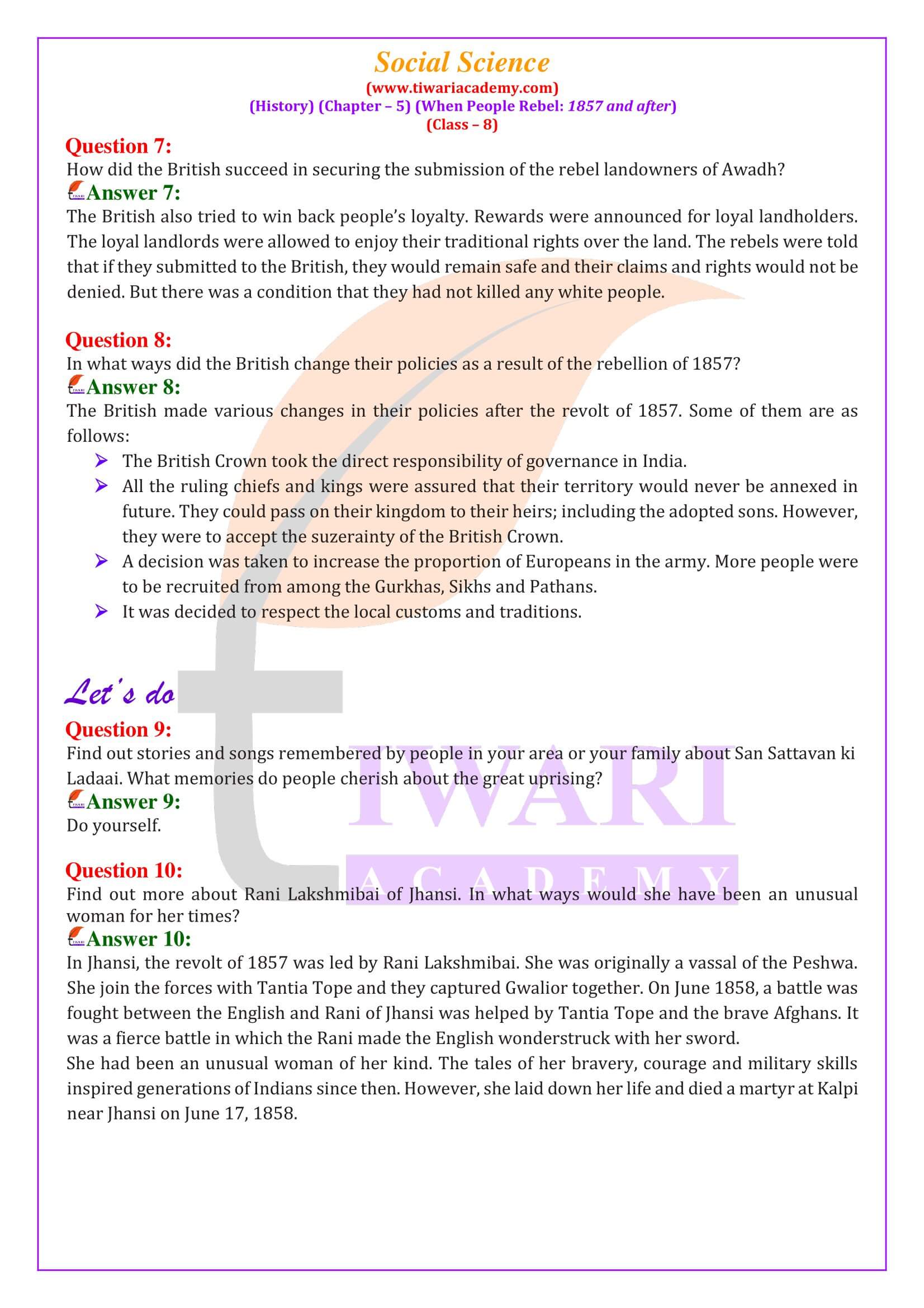NCERT Solutions for Class 8 Social Science History Chapter 5 When People Rebel in English and Hindi Medium updated according to new CBSE Syllabus issued for academic session 2024-25. Class 8 History chapter 5 solutions and explanations are modified and revised as per the rationalised NCERT books issued for 2024-25 exams.
NCERT Solutions for Class 8 Social Science History Chapter 5
Download NCERT Solutions 2024-25 for class 8 other subjects also. Join the Discussion Forum and share your knowledge to help the others. For any educational help, please contact us without any hesitation.
Class 8 History Chapter 5 Extra Questions
Why were Power of Nawabs and Rajas reducing?
Since the mid-eighteenth century, nawabs and rajas had seen their power erode. They had gradually lost their authority and honour. Residents had been stationed in many courts, the freedom of the rulers reduced, their armed forces disbanded and their revenues and territories taken away by stages. Many ruling families tried to negotiate with the Company to protect their interests.
What was the Popular Rebellion?
A very large number of people begin to believe that they have a common enemy and rise up against the enemy at the same time. For such a situation to develop people have to organise, communicate, take initiative and display the confidence to turn the situation around. Such a situation developed in the northern parts of India in 1857. After a hundred years of conquest and administration, the English East India Company faced a massive rebellion that started in May 1857 and threatened the Company’s very presence in India. Sepoys mutinied in several places beginning from Meerut and a large number of people from different sections of society rose up in rebellion.
Class 8 History Chapter 5 Question Answers
CBSE NCERT Solutions for Class 8 Social Science History Chapter 5 When People Rebel is given below to download free for session 2024-25. Download NCERT solutions Offline Apps for offline use or use as it is without downloading online.
| Class: 8 | Social Science |
| Subject: | History |
| Chapter 5: | When People Rebel |
| Content: | Textbook Questions with Extra Practice |
| Content Type: | Text and Images |
Important Questions on 8th History Chapter 5
What was the demand of Rani Lakshmibai of Jhansi that was refused by the British?
After the death of her husband, Rani Lakshmibai wanted her adopted son to be recognized as the heir to the kingdom.
What did the British do to protect the interests of those who converted to Christianity?
In 1850, a new law allowed an Indian who had converted to Christianity to inherit property of his ancestors. This law made it easier to convert to Christianity.
What objections did the sepoys have to the new cartridges that they were asked to use?
It was rumored that the new cartridges were coated with the fat of cows and pigs. This hurt the sentiments of both the Hindus and the Muslims.
How did the last Mughal emperor live the last years of his life?
The last Mughal emperor spent the last years of his life in a jail in Rangoon, along with his wife.
What could be the reasons for the confidence of the British rulers about their position in India before May 1857?
Within hundred years of assuming the Diwani of Bengal, the British became the unquestioned rulers over a large part of the Indian subcontinent. They rarely had to use force to take control over a territory. They were doing profitable trade which was their main objective. They also succeeded in winning the support of most of the local rajas and chieftains. These are some of the possible reasons for the confidence of the British rulers about their position in India before May 1857.
What impact did Bahadur Shah Zafar’s support to the rebellion have on the people and the ruling families?
Answer 6: The decision by Bahadur Shah Zafar to support the rebellion had dramatically changed the entire situation. Most of the smaller rulers and chieftains had been ruling over their territories on behalf of the Mughal ruler. They hoped that if the Mughal ruler could once again resume power, they would also be able to rule their own territories once again. People were emboldened by an alternative possibility.
How did the British succeed in securing the submission of the rebel landowners of Awadh?
The British also tried to win back people’s loyalty. Rewards were announced for loyal landholders. The loyal landlords were allowed to enjoy their traditional rights over the land. The rebels were told that if they submitted to the British, they would remain safe and their claims and rights would not be denied. But there was a condition that they had not killed any white people.
In what ways did the British change their policies as a result of the rebellion of 1857?
The British made various changes in their policies after the revolt of 1857. Some of them are as follows: The British Crown took the direct responsibility of governance in India. All the ruling chiefs and kings were assured that their territory would never be annexed in future. They could pass on their kingdom to their heirs; including the adopted sons. However, they were to accept the suzerainty of the British Crown. A decision was taken to increase the proportion of Europeans in the army. More people were to be recruited from among the Gurkhas, Sikhs and Pathans. It was decided to respect the local customs and traditions.
Find out more about Rani Lakshmibai of Jhansi. In what ways would she have been an unusual woman for her times?
In Jhansi, the revolt of 1857 was led by Rani Lakshmibai. She was originally a vassal of the Peshwa. She join the forces with Tantia Tope and they captured Gwalior together. On June 1858, a battle was fought between the English and Rani of Jhansi was helped by Tantia Tope and the brave Afghans. It was a fierce battle in which the Rani made the English wonderstruck with her sword. She had been an unusual woman of her kind. The tales of her bravery, courage and military skills inspired generations of Indians since then. However, she laid down her life and died a martyr at Kalpi near Jhansi on June 17, 1858.
Important Notes on 8th History Chapter 5
The peasants and the sepoys
In the countryside peasants and zamindars resented the high taxes and the rigid methods of revenue collection. Many failed to pay back their loans to the moneylenders and gradually lost the lands they had tilled for generations.
The Indian sepoys were unhappy about their pay, allowances and conditions of service. Some of the new rules, moreover, violated their religious sensibilities and beliefs. So when in 1824 the sepoys were told to go to Burma by the sea route to fight for the Company, they refused to follow the order, though they agreed to go by the land route. They were severely punished and since the issue did not die down, in 1856 the Company passed a new law which stated that every new person who took up employment in the Company’s army had to agree to serve overseas if required.
Sepoys also reacted to what was happening in the countryside. Many of them were peasants and had families living in the villages. So the anger of the peasants quickly spread among the sepoys.






